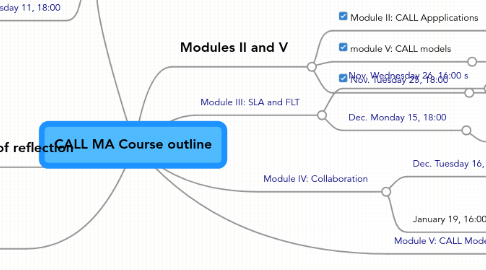
1. Course overview and Module I
1.1. Oct. Wednesday 22, 18:00
1.2. Oct. Monday 27, 16:00
1.2.1. 1. The emergence of CALL 2. A brief history of CALL 3. Hypertext, hypermedia and multimedia
1.3. Nov. Tuesday 11, 18:00
1.3.1. Seminar 1
2. Final presentation: February 9, 18:00
2.1. Area of reflection
2.2. General CALL field
2.3. Normalization
2.4. Contributions to language teaching and research
3. Areas of reflection
3.1. Software: traditional CALL
3.1.1. Generic software in CALL
3.1.1.1. Sample research article Mapping successful language learning approaches in the adaptation of generic software (CALL, 2006):
3.1.2. Developing software for CALL
3.1.2.1. A software development approach for computer assisted language learning. CALL 2005
3.2. Data-Driven Learning. language corpora in CALL
3.2.1. Annotation solutions for Data Driven Learning (ReCall 2009) + SACODEYL website
3.2.2. INTEGRATING CORPUS CONSULTATION IN LANGUAGE STUDIES, Language learning and technology 2005
3.3. Web 2.0 and CALL
3.3.1. WEB 2.0: New Perspectives for Digital Media in Language Learning? EUROCALL 2007 Plenary
3.3.2. Conole, Grainne. Listening to the Learner Voice: The Ever Changing Landscape of Technology Use for Language Students. ReCALL. v20 n2 p124-140 May 2008.
3.4. CALL in consoles: NDS and other developments
3.4.1. Methodology for evaluating a novel education technology: a case study of handheld video games in Chile. Computers & Education, Volume 46, Issue 2, February 2006, pp. 174-191.
3.4.2. Examining the pedagogical foundations of modern educational computer games Computers & Education, Volume 51, Issue 4, December 2008, pp. 1729-1743
4. Modules II and V
4.1. Module II: CALL Appplications
4.1.1. Nov. Wednesday 12, 18:00 8 CALL Applications
4.2. module V: CALL models
4.2.1. Nov. Wednesday 12, 18:00 8 CALL Applications
4.3. Nov. Tuesday 25, 18:00
4.3.1. Seminar 2
5. Module III: SLA and FLT
5.1. Nov. Wednesday 26, 16:00 s
5.1.1. Second-language Acquisition and models of instruction/ Theoretical and pedagogical concern
5.1.1.1. Second-language Acquisition and models of instruction/ Theoretical and pedagogical concern
5.2. Dec. Monday 15, 18:00
5.2.1. Second-language Acquisition and models of instruction/ Theoretical and pedagogical concern
6. Module IV: Collaboration
6.1. Dec. Tuesday 16, 18:00
6.1.1. Computer-mediated communication in English for specific purposes: A case study with computer science students at Universiti Teknologi Malaysia. CALL 2006 + Learning electronic literacy skills in an online language learning community. CALL 2005 ()
6.1.1.1. http://eurocall2007.blogspot.com/2007/09/co-operative-audiovisual-comprehension.html
6.1.2. What is out there?
6.2. January 19, 16:00
6.2.1. Seminar 4
